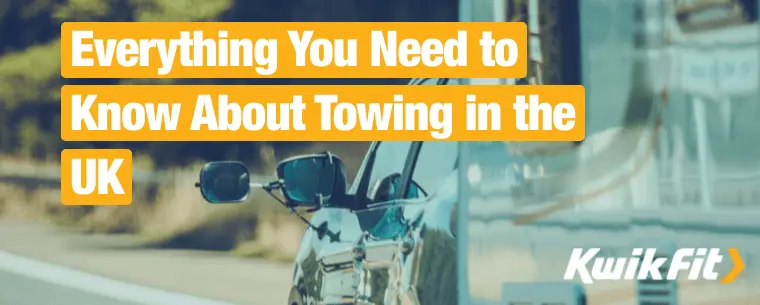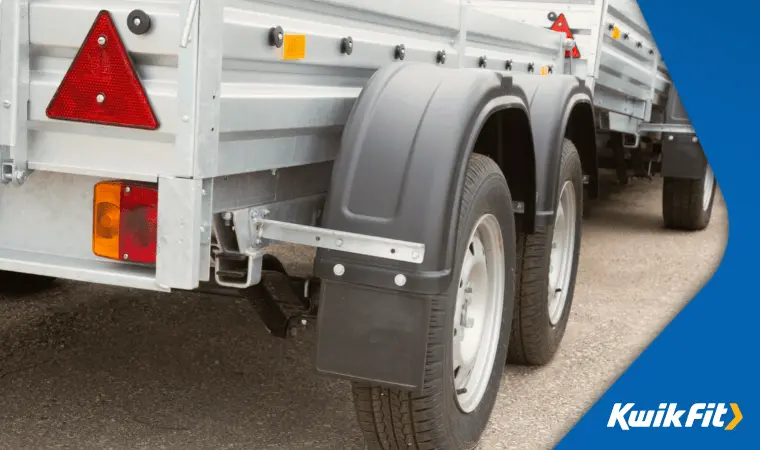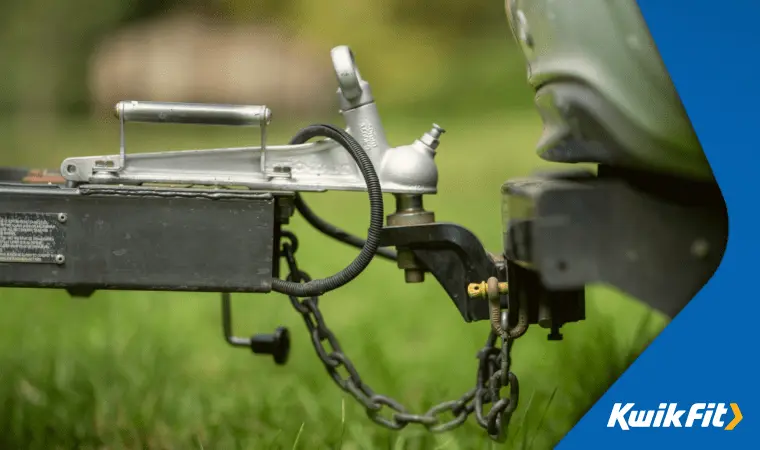Everything You Need to Know About Towing in the UK
Jack Dreyer | Thursday 27th July 2023 12:00pm

From weight limits to width, legislation to licences, there are a whole host of factors and hoops to jump through when it comes to safely (and legally) towing something as a driver in the UK.
To help you navigate through the safety considerations, best practices, and legal requirements, we’ve put together this complete guide. Use the contents below to navigate through the guide to find the exact answers you’re looking for before setting off.
- Licence requirements for towing
- Towing with a car: What can you tow?
- Towing Trailers
- Towing heavier items
- What is the speed limit for towing?
- Towing width & length restrictions
- Towing equipment
- Staying compliant with towing equipment
- Different types of towing equipment
- Towing bars
- Towing mirrors
- Trailer or caravan brakes
- Breakaway cables
- Number plates
- Towing best practices
Licence requirements for towing
First things first, before going anywhere near a trailer, you’ll need a licence that allows you to do so. Before towing a vehicle, you’ll need to be:
- Old enough
- In possession of the right type of licence
If you have a regular drivers’ licence, you can already tow a trailer up to a certain weight limit. For more complex setups, the government has a handy tool that allows you to check what you can tow (and with what vehicle).
Towing with a car: What can you tow?
You are allowed to tow trailers with your car driving licence, but only up to a certain weight, as measured in something called MAM (or ‘Maximised Authority Mass’). The MAM refers to the maximum weight your vehicle can tow, essentially a sum of your vehicle’s own weight and the additional weight of the load.
The MAM for your vehicle can be found in the owner’s manual. If you don’t have this, you should look for the ‘gross train weight’ value. This can be found on the VIN (Vehicle Identification Plate) on your car, usually located under the bonnet or inside the driver’s side door. For safety, this value should never be exceeded.
The weight you’re allowed to tow is decided by when you got your licence.
If you got your licence before 1 January 1997
- You can usually drive a vehicle and trailer with a combined weight of up to 8,250kg MAM.
- You’re also allowed to drive a minibus with a trailer over 750kg MAM.
If you got your licence on or after 1 January 1997
- You can tow a trailer that weighs up to 3,500kg MAM.
Towing trailers
When towing trailers of any kind, it is important that you feel safe on the road and in control of all parts of your load. Hesitancy and uncertainty can cause accidents. One of the best ways to increase your confidence with towing is by taking some simple government-recommended training. Trailer safety, towing caravans, and towing horse boxes are all topics covered. Use the following links to find a training provider or a course:

Towing heavier items
But what about if you need to tow something weightier? If the combined weight of your vehicle and the item you wish to tow is heavier than what your licence allows, don’t worry, there are measures you can take. Namely, this takes the form of upgrading your licence to a medium-sized lorry one. Here’s how you can do that:
- Applying for a provisional licence for a medium-sized lorry and trailer (category C1+E)
- Pass the lorry theory test
- Pass the C1+E driving test
If you are looking to drive a medium size lorry as part of your job, you'll need to take extra Driver Certificate of Professional Competence (CPC) tests. If you are successful, you’ll be able to drive vehicles and trailers with a combined weight of up to 12,000kg MAM.
What is the speed limit for towing?
One of the most overlooked aspects of towing a trailer or load is the speed limit change. Due to the additional weight, vehicles towing something are subject to a different set of speed limit requirements. According to The Highway Code:
- If you’re towing a trailer or a caravan on a dual carriageway, the speed limit for you is 70 mph.
Towing equipment
We understand that, sometimes, towing is less of a planned activity and more of a last resort. As is especially true in recovery operations, you may not always have been able to plan ahead and gather the correct equipment.
Staying compliant with towing equipment
However, as a best practice, it is always a good idea to keep towing equipment with your vehicle and, if you have a trailer or caravan that you tow, to keep it up to date and well maintained in line with the following guidelines.
Fundamentally, the equipment you have must:
- Meet specified safety standards
- Always be used correctly
- Be well maintained and in good working order
This includes everything from fixtures to trailer tyres and caravan tyres. If you fail to adhere to the above, and use a vehicle deemed to be in a ‘dangerous condition’, you could be fined up to £2,500, receive 3 penalty points, or even get banned from driving altogether.
Different types of towing equipment
Towing bars
A tow bar is a metal bar that safely attaches your load to your vehicle, allowing for both control and flexibility in equal measures to ensure safe vehicle handling when towing.
Your tow bar will need to meet the EU regulations for your vehicle. Tow bars compliant with these regulations are known as ‘type approved’ and come fitted, a bit like the tyre labels, with a label that has:
- An approval number
- The details of the vehicles it is compatible with and/or approved for
As a side note, if you first used your car before 1 August 1998, your tow bar does not need to be type-approved
Towing mirrors
One of the most crucial parts of towing is visibility. Since a trailer extends the space your vehicle takes up on the road, your usual mirrors will no longer suffice to cover the blind spots, width, and length of it. As such, towing mirrors are needed.
These are detachable mirrors that extend the driver’s field of vision in line with the extensions to the height, weight, and length of the load they are towing. You can purchase these from a number of online retailers, but, regardless of the model you opt for, make sure they are:
- Connected suitably. Not likely to fly off when you reach high speeds and damage or distract other road users.
- Adjusted suitably. Allowing for a great view of your vehicle, load, and road.
Failure to tow with proper towing mirrors can lead to a fine of up to £1,000 or 3 penalty points on your licence!
Trailer or caravan brakes
Brakes are not needed on every load you tow, especially not smaller trailers. However, when a trailer or caravan weighs over 750kg, it must have a fully-functioning brake system.
Not dissimilar to the brakes on your car, these brakes should be well maintained. What’s more, a breakaway cable — or secondary coupling — is also required for heavier loads.

Breakaway cables
If the large load you are towing becomes detached from your vehicle, this can be life-threatening to other users on the road.
That’s why for large trailers, and caravans especially, breakaway cables are an essential safety device. Should the caravan or trailer get detached, this cable applies the brakes, slowing the free-moving hazard down.
All caravans and trailers manufactured after 1982 with a MTPLM (maximum technically permissible laden mass) of between 750kg and 3500kg are legally permitted to be fitted with this cable.
Number plates
Lastly, when towing a load behind your vehicle, you must attach a number plate to it. This number plate must be:
- Attached securely
- The same as the number plate of the vehicle towing it
- Unobscured and clean
- In a compliant font that is easy to read.
You can find the government’s official number plate guidance and stipulations here.
Towing best practices
Got all that? We appreciate there was a lot of information to digest there, so let’s break it down into the 4 core things to remember when towing:
- Make sure you are legally allowed to tow the trailer/caravan/load by looking at your driving licence.
- Ensure that your vehicle is compatible with the weight, length, width, and type of trailer/caravan/load that you wish to tow.
- Ensure you have all the correct towing equipment in place (including tow bars, mirrors, breakaway cables, and correctly-positioned number plates).
- Drive safely according to the conditions of the road and the speed limits that apply to you.
Got a worry about towing? Need to make sure your caravan is up to scratch before taking it on holiday?
Get in touch with the experts at your local Kwik Fit today.
Any facts, figures and prices shown in our blog articles are correct at time of publication.
Featured Articles
Is it Illegal to Drive With One Headlight?
Saturday 19th July 2025
Wondering if it’s illegal to drive with one headlight? Learn about the safety risks and penalties of illegal blown bulbs and why you should fix them promptly.
Air Con in EVs & Hybrids: Experts Answer Your Questions
Monday 30th June 2025
Does air con drain EV batteries? Can you use the air con while charging an electric car? Find out the answers to these questions & more from Kwik Fit’s experts.
Why Is Your Car Making a Noise? Fixes & Tips
Friday 13th June 2025
When your car starts making unexpected noises, it can certainly be quite disconcerting; it may be nothing to worry about, but here’s what you need to know.









